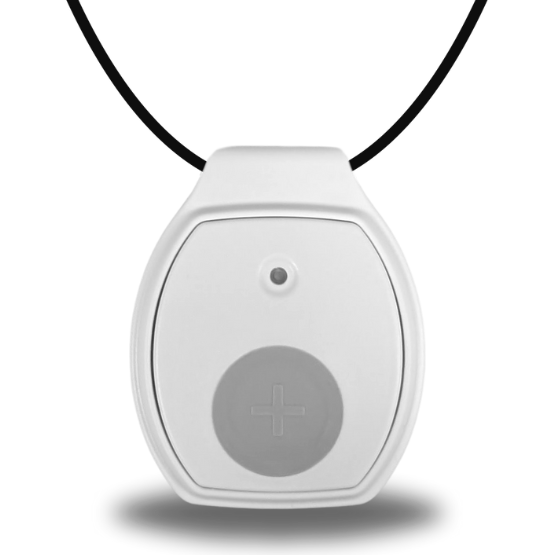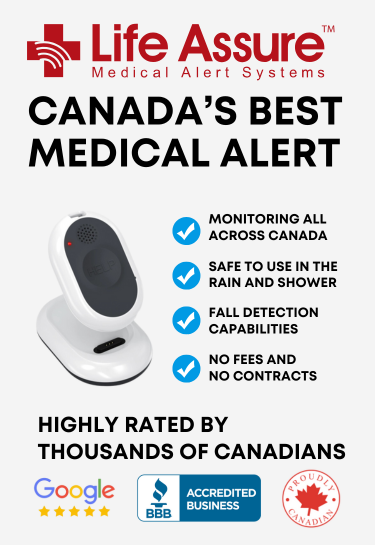Understanding The Difference: Medical Alert Watch Vs Medical Alert Bracelet
We often are of the notion that medical conditions along with age will inhabit our freedom of living independently. This can be quite challenging for anyone who wants to live a life with confidence and dignity.
However, it is almost inevitable that medical conditions will arise once we age and that we need to be attentive to our bodies. This is where a medical alert system comes in.
A potential device that can trigger alarms and contact the authorities when it senses an emergency, a medical alert system is no less than a life savior for many. Two of the most common forms that are available are a medical alert watch and a bracelet.
Life Assure Product Quiz
Find The Perfect Medical Alert Device
Take our 30 second quiz and discover which Life Assure medical alert device is the right fit for you or a loved one.
Life Assure Product Quiz
Find The Perfect Medical Alert Device
Take our 30 second quiz and discover which Life Assure medical alert device is the right fit for you or a loved one.
The Difference Between a Medical Alert Watch and a Medical Alert Bracelet

Both the devices are worn on the wrists. Functions and aspects differ despite both alerting during emergencies. Therefore, they serve the basic function of alarming during falls or accidents. That means they provide crucial assistance in critical situations. Here is how they differ:
Functionality and Features
A medical alert watch is more advanced. It has multiple features. Therefore, it offers more than just emergency alerts. GPS tracking is included. Fall detection is also provided.
Hence, it offers comprehensive monitoring. Some even track health metrics. Heart rate and activity levels can be monitored. Altogether, it's a multipurpose device.
A medical alert bracelet, on the other hand, is simpler. It primarily sends alerts. Emergency contacts are notified. Therefore, it's straightforward. Some models include fall detection. However, additional features are rare. Hence, it's less comprehensive.
Ease of Use
Medical alerts that are watches can be complex. Many features can overwhelm users. Therefore, it might not be suitable for everyone. Setup and operation require some tech-savviness. Hence, it's best for tech-friendly users.
Medical alert bracelets are simpler to use. Few functions mean easy operation. Therefore, it's user-friendly. Elderly users might prefer it. Hence, simplicity is its strong suit.
Appearance and Design
Medical watch alerts look like regular watches. Therefore, they are discreet. Multiple designs are available. Hence, users can choose stylish options. They blend in well with daily outfits.
Medical alert bracelets are usually noticeable. They often have a medical symbol. Therefore, they stand out. Designs are limited. Hence, they prioritize function over style. However, some prefer this visibility. It indicates medical information at a glance.
Battery Life
For watches that are medical alerts, they have a short battery life. Many features drain power. Therefore, frequent charging is required. It may last a few days. Hence, users must be diligent about charging.
Medical alert bracelets typically have longer battery life. Fewer features consume less power. Therefore, they need less frequent charging. Some last for months. Hence, it's convenient for forgetful users.
Connectivity
Most alert watches rely on connectivity. They use cellular networks or Wi-Fi. Therefore, they require signal coverage. In rural areas, they might not work well. Hence, urban users benefit more.
Medical alert bracelets often work independently. No connectivity is needed. Therefore, they are reliable everywhere. They use simple mechanisms. Hence, coverage issues are nonexistent.
Emergency Response
In case of alert watches, they contact services directly. Therefore, help is immediate. They call or message emergency contacts. GPS provides location. Hence, responders find users quickly.
Medical alert bracelets usually alert only contacts. Therefore, the response may be slower. Emergency services are not always contacted directly. However, that may not be the case always. Hence, it relies on contact availability.
Cost
Medical alert watches are expensive. Advanced technology increases costs. Therefore, they are a significant investment. Monthly fees may apply for services. Hence, ongoing costs are involved.
Medical alert bracelets are cheaper. A simpler design reduces the price. Therefore, they are affordable. No monthly fees are usually required. Hence, it's a cost-effective option.
Suitability
A watch suits active individuals. Multiple features support active lifestyles. Therefore, they are ideal for tech-savvy users. Younger individuals might prefer them. Hence, they cater to a tech-oriented audience.
Medical alert bracelets suit elderly users. This is mostly because they rely on two things, those being simplicity and reliability. Therefore, they are ideal for less active individuals. Older individuals might prefer them. Hence, they cater to a senior audience.
Overall Comparison
Almost all medical alerts that are watches are versatile. They offer multiple features and services. Therefore, they provide comprehensive support. However, they require tech-savviness and frequent charging. Hence, they are best for certain users.
Medical alert bracelets are straightforward. They focus on essential functions. Therefore, they provide reliable support. However, they lack advanced features. Hence, they are best for different users.
Which One Is More Suitable to Wear?

If you are confused about which one to buy, we are here for you. Here is how each one will fare for the respective group of individuals as listed below.
Tech-Savvy Individuals
This group of individuals prefer a medical alert watch. Multiple features support tech needs. Therefore, they are ideal for those comfortable with technology. Hence, a watch is suitable for tech-oriented users.
Elderly Users
Elderly users mostly prefer bracelets as they aren’t too complicated to use. In other words, they are simple to use and do what it claims. Hence, a bracelet suits elderly users.
Active Lifestyles
Active individuals benefit from watches. GPS tracking and activity monitoring are included. Therefore, they support active lifestyles. Hence, a watch is suitable for those on the go.
Sedentary Lifestyles
Sedentary individuals prefer bracelets. Few functions mean easy operation. Therefore, they are ideal for those with a quiet lifestyle. Hence, a bracelet is suitable for sedentary individuals.
Budget-Conscious Individuals
Budget-conscious individuals prefer bracelets. A simpler design reduces the price. Therefore, they are cost-effective. No monthly fees are usually required. Hence, a bracelet suits those on a budget.
Individuals Needing Immediate Help
Individuals needing immediate help benefit from a watch. Direct contact with services provided. Therefore, the response is quick. GPS helps locate users. Hence, a watch suits urgent needs.
Individuals with Limited Tech Skills
Individuals with limited tech skills prefer bracelets. Few functions mean easy operation. Therefore, they are user-friendly. Hence, a bracelet suits those less comfortable with technology.
Conclusion
To sum it up, both devices are essential. Therefore, choosing depends on the person. A medical alert watch suits tech-savvy, active, and urgent needs. Bracelets suit elderly, budget-conscious, and tech-limited users.
That means both have unique advantages. Though different, both offer safety and independence. Hence, investing in the right one is crucial. Therefore, consider individual needs and preferences.












 Get Help With The Push Of A Button
Get Help With The Push Of A Button















